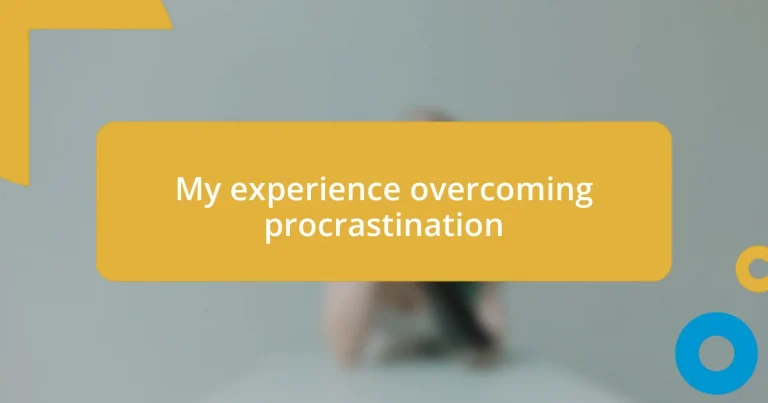Key takeaways:
- Understanding emotional triggers like fear of failure and perfectionism is crucial to overcoming procrastination.
- Setting realistic goals and deadlines, along with time management techniques like time blocking, enhances productivity and reduces anxiety.
- Developing motivation through personal purpose and accountability partnerships fosters progress and personal growth.
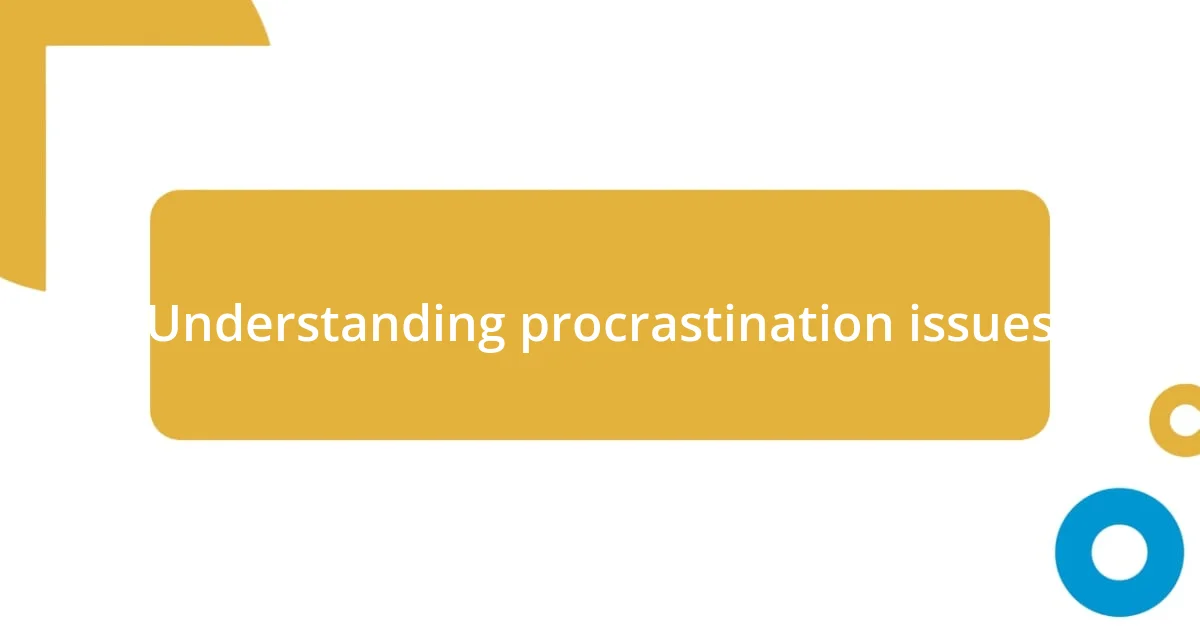
Understanding procrastination issues
Procrastination often begins as a simple distraction, but it can quickly spiral into a complex web of avoidance and anxiety. I remember a time when I had a project due, but instead of working on it, I found myself cleaning my entire house. It felt productive at the moment, but deep down, I was just running away from the task that truly mattered.
This avoidance stems from various emotional factors, including fear of failure or perfectionism. Have you ever felt that urge to delay something because you wanted it to be absolutely perfect? I’ve been there, agonizing over an assignment, convinced that the sooner I started, the greater the pressure would be to meet unrealistic standards. It’s exhausting and often leads to more stress in the long run.
Understanding why we procrastinate is crucial to overcoming it. I’ve learned that self-awareness is the first step. When I took time to reflect on my behavior, I recognized patterns that triggered my procrastination. Was it lack of interest? The overwhelming nature of the task? Each revelation brought me closer to building better habits and, ultimately, conquering the cycle of delay.
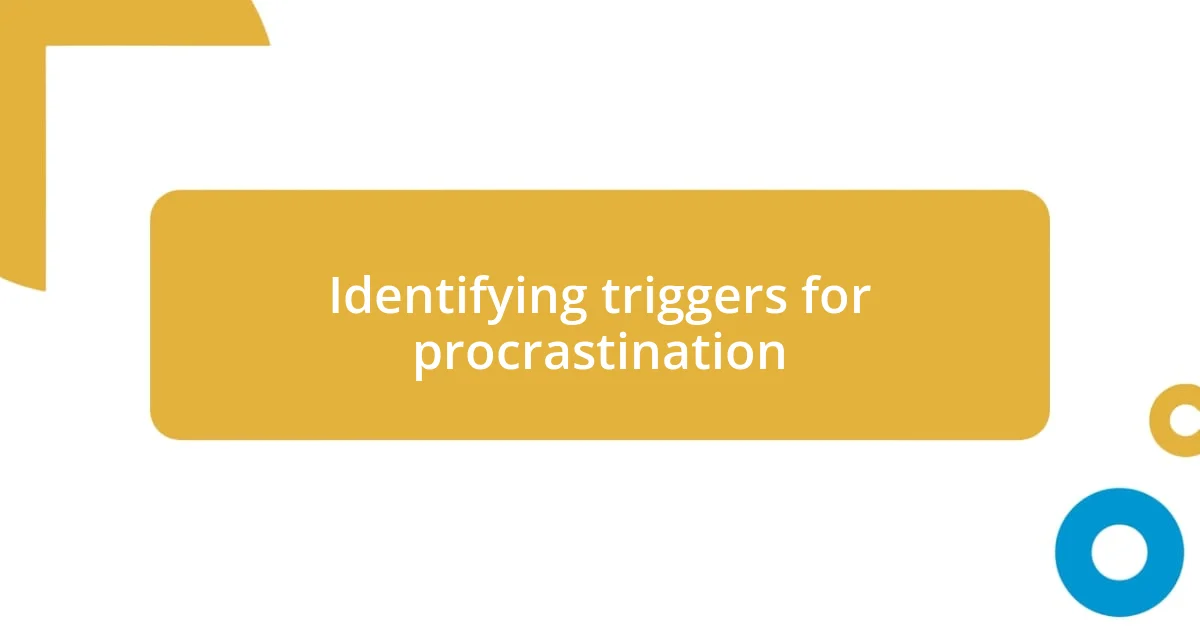
Identifying triggers for procrastination
Identifying the specific triggers for procrastination can profoundly shift our approach to tasks. For me, it often stemmed from feeling overwhelmed. When I faced a massive workload, I’d find myself scrolling through social media, convinced that a brief distraction would renew my focus. Ironically, it only led to more sidetracking and prolonged anxiety over looming deadlines.
To better understand your own triggers, consider these common culprits:
- Fear of Failure: The dread of not meeting expectations can freeze us in our tracks.
- Perfectionism: The need for everything to be flawless often leads to avoidance.
- Overwhelm: Large tasks can feel insurmountable, pushing us to escape rather than tackle.
- Disinterest: Tasks that don’t excite or engage can easily be postponed.
- Fatigue: Mental and physical exhaustion makes starting any task feel daunting.
Recognizing these patterns in my behavior was like flipping a light switch. Once I acknowledged what pushed me to procrastinate, I could devise strategies to combat those feelings instead of succumbing to them.
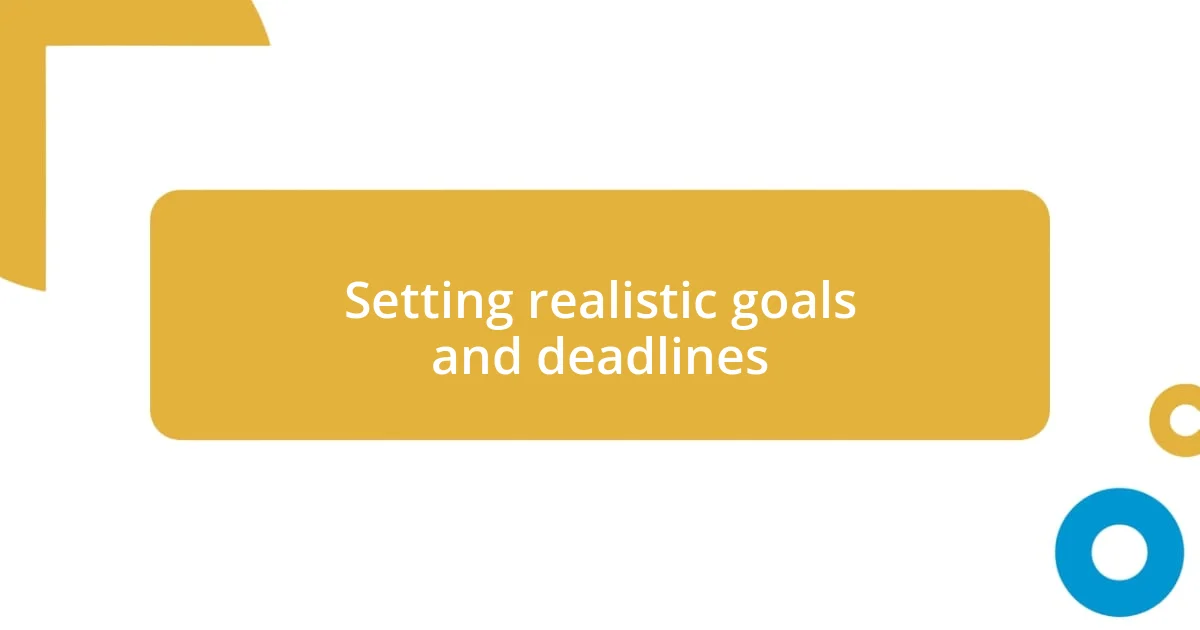
Setting realistic goals and deadlines
Setting realistic goals is vital for overcoming procrastination. I’ve found that, when I set achievable milestones, it not only boosts my motivation but also keeps my anxiety in check. I remember when I was working on a major project; instead of breaking it down into manageable parts, I treated it like a single, overwhelming task. But once I started setting daily goals and deadlines, like completing just one section a day, the project felt much more attainable. It was as if the weight of expectation lifted, allowing me to focus and make consistent progress.
Deadlines should be treated as flexible guideposts rather than rigid rules. When I began to approach deadlines with a mindset of adaptability, I noticed a shift in my productivity. For instance, if I wasn’t able to meet a goal today due to unforeseen circumstances, I’d take a moment to adjust my schedule rather than beating myself up over it. This acceptance allowed me to maintain momentum without spiraling into procrastination. It’s crucial to remember that life can throw unexpected events our way, and having a flexible attitude creates room for adjustments while still moving forward.
Ultimately, balancing aspiration with feasibility can reignite our enthusiasm for tasks. In my experience, dreaming big is great, but without a practical roadmap, it can lead to frustration. For instance, I had once aimed to complete a book in a month, only to find myself stressed and unproductive. But when I shifted my focus to reading a few pages daily instead, my interest rekindled, and I finished the book more comfortably than I had ever anticipated. Setting realistic goals makes the journey enjoyable and allows for genuine growth.
| Characteristics | Unrealistic Goals | Realistic Goals |
|---|---|---|
| Definition | Imposing and unattainable | Achievable and manageable |
| Impact on Motivation | Demotivating and discouraging | Encouraging and fulfilling |
| Adaptability | Rigid and inflexible | Flexible and adjustable |
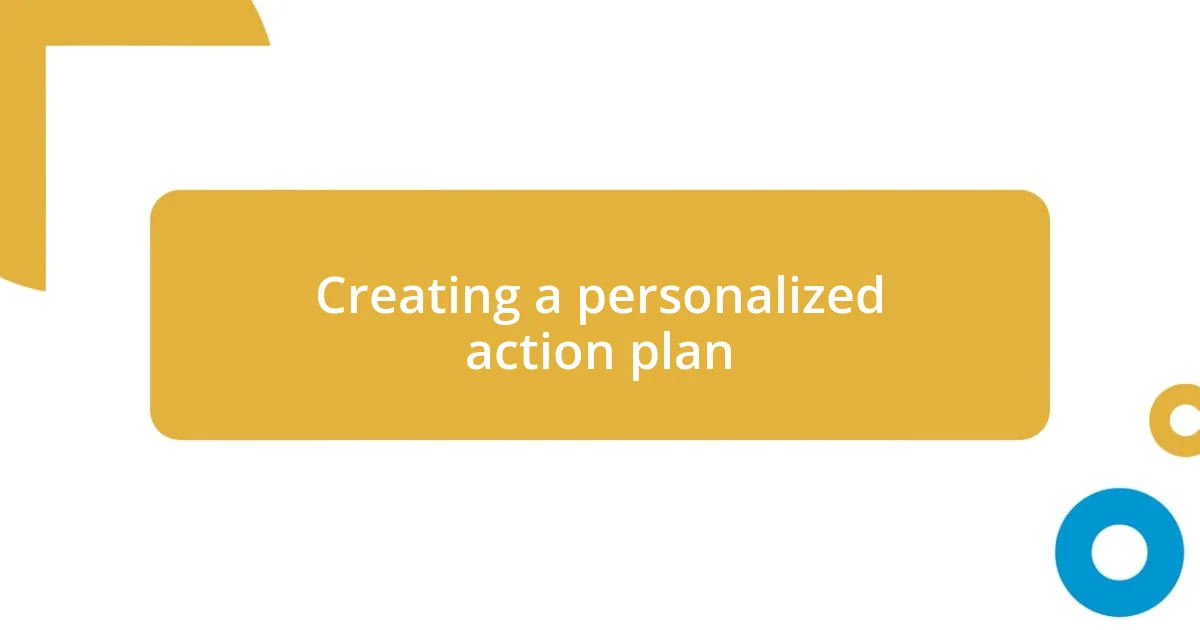
Creating a personalized action plan
Creating a personalized action plan can transform the way you approach tasks. When I sat down to draft my own plan, I felt a mix of excitement and apprehension. I realized that just listing tasks wouldn’t cut it; I needed a strategy tailored to my tendencies. So, I mapped out my daily routine, identifying the best times for concentration and when I typically felt drained. This simple act of reflection made the mundane feel more intentional and less of a chore.
I also learned that accountability played a crucial role in my plan. I remember teaming up with a friend to share our weekly goals. We check in regularly, discussing progress and obstacles. It turned into a supportive ritual—I found myself less likely to avoid tasks knowing I had someone to report to. This mutual commitment created an environment that fostered productivity and helped me celebrate small wins together.
Don’t underestimate the power of celebrating progress. For instance, after finishing a particularly challenging section of work, I treat myself to something I enjoy—a favorite snack or a short episode of a beloved show. I ask myself: How does celebrating these little achievements impact my motivation? The answer became clear: it ignites joy and propels me forward, making it easier to tackle the next task on my list. Remember, your action plan should not only be about the work; it should also incorporate moments of reward that keep you engaged and eager to continue.
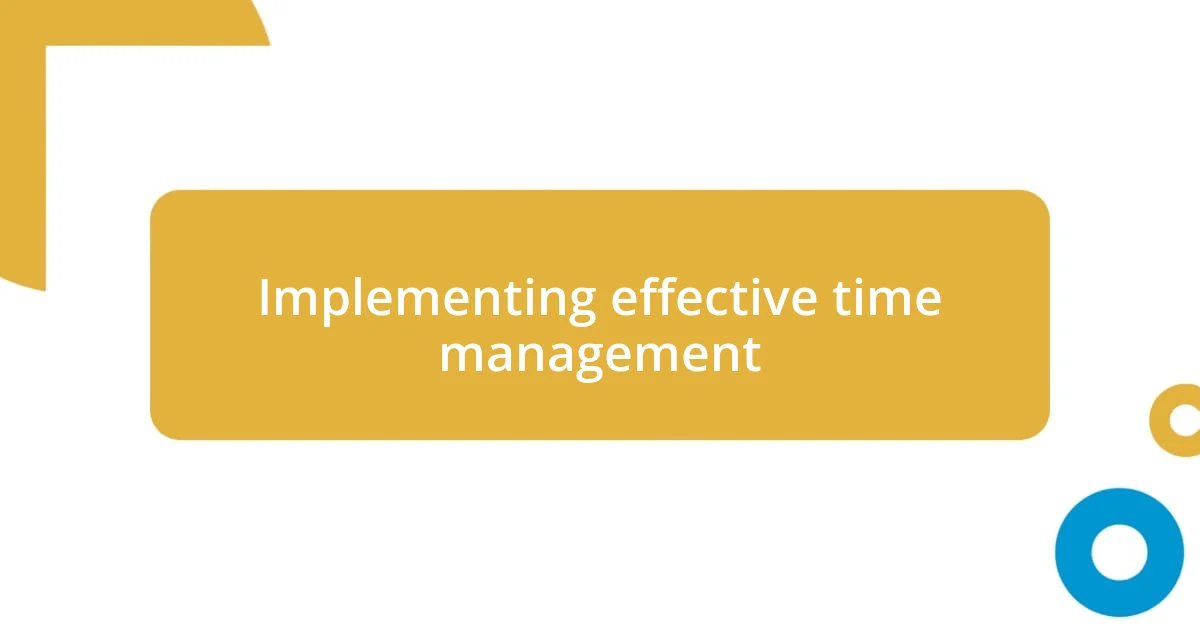
Implementing effective time management
Implementing effective time management can often feel like achieving a delicate balance. I recall a time when I struggled with detailed planners, often leaving tasks incomplete because I had over-scheduled myself. Then, I discovered the power of time blocking—a simple but transformative method that enables me to allocate specific chunks of my day to particular activities. This way, instead of feeling overwhelmed by everything I had to do, I created a structured yet flexible system, allowing me to focus deeply on one thing at a time without distractions.
Additionally, I found that prioritizing tasks became a game-changer for my productivity. I made it a habit to list my tasks every morning and rank them based on urgency and importance. This practice not only helped me recognize what truly needed my attention but also illuminated the path for the day ahead. A memorable moment was when I had multiple deadlines looming. By focusing on the most pressing tasks first, I tackled one project while the others naturally slipped into place, reducing my anxiety significantly. It’s uncanny how clarifying what matters can help us use our time more wisely.
Moreover, I truly believe that learning to say “no” is an essential part of effective time management. In the beginning, I thought saying yes to every request aligned with being helpful and inclusive. However, I soon realized it diluted my focus. I’ve learned to set boundaries—not just to protect my schedule but to honor my commitments to myself. I remember the relief I felt the first time I declined an invitation to a gathering, choosing instead to dedicate that evening to a long-overdue project. It became apparent that sometimes, saying no can be the ultimate act of self-care, allowing us to invest our time where it matters most.
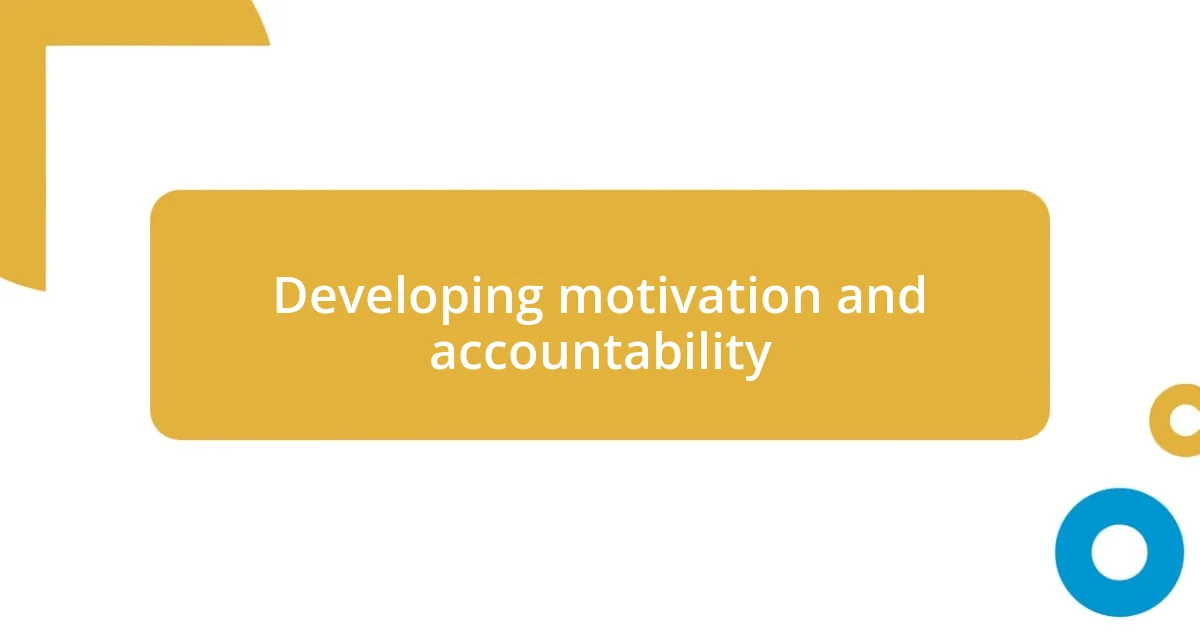
Developing motivation and accountability
Developing motivation and accountability necessitates a shift in mindset. I vividly remember my initial struggles with staying motivated; it felt as if I was constantly battling a mental brick wall. Then I started to define my “why” behind each task. Asking myself what truly mattered made a difference. I found that understanding the greater purpose behind my efforts ignited a spark within me. Isn’t it fascinating how our motivation can transform when we connect our tasks to our personal values?
Having regular check-ins with an accountability partner was another game-changer. I’ll never forget the first time I confided in my colleague about my procrastination struggles. We agreed to meet weekly to discuss not just our goals but our feelings about them. It was invigorating to share my challenges and celebrate progress with someone who understood my journey. This mutual support helped me break down barriers of isolation, making me feel accountable not only for the tasks but also for my commitment to improvement.
Furthermore, I learned that keeping a progress journal can help track not only what I accomplished but also how I felt about those achievements. Reflecting on those entries often made me realize my growth. It’s rewarding to see that my small victories are stepping stones to bigger goals. Could writing down your successes help you, too? For me, it’s like capturing snapshots of growth, and each entry nudges me towards greater accountability for my actions.












